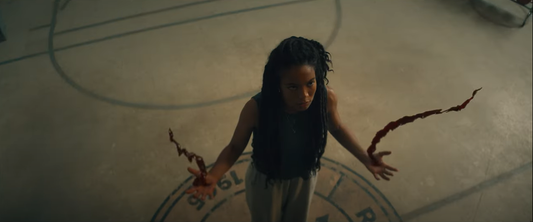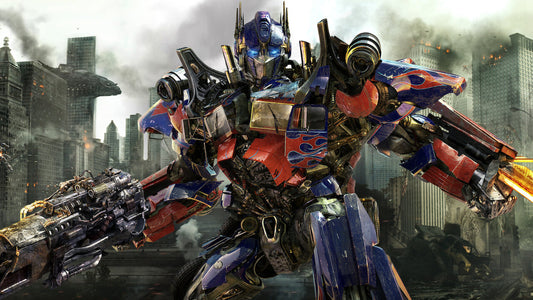Shang-Chi and the Legend of the Ten Rings may be the second film in Phase Four of the Marvel Cinematic Universe, but it feels like the proper ushering in of a new age for the mega franchise more so than July’s Black Widow. This isn’t merely because Shang-Chi is the first exclusively theatrical release in over two years from Marvel Studios; the debacle surrounding the joint theatrical / Disney+ Premier Access release of Black Widow led to somewhat disappointing box office return (at least for a studio like Marvel who are accustomed to billion dollar numbers) and an ongoing legal battle between Disney and longtime star of the franchise Scarlett Johansson. But Shang-Chi’s immediate success - earning nearly $100 million in its opening weekend and defeating a record previously held by Rob Zombie’s Halloween since 2007 - is also due to the fact that parts of it simply feel refreshingly different from most of the ever-growing universe’s entries, and introduces several brand new heroes to the fray in exciting ways.
The film begins with Xu Wenwu (Tony Leung), a man who discovers a mysterious set of items known as the Ten Rings. Granting him both immortality and an array of deadly powers, Wenwu uses the rings to conquer armies and establish his own empire throughout the centuries, aptly named the Ten Rings Organization. When Wenwu arrives at a hidden magical village named Ta Lo with the intention of taking over, the seemingly invincible warrior meets his match at the hands of Ying Li (Fala Chen), a guardian of the village. Through a romantic fight that resembles a dance, the two fall in love and Wenwu retires the rings, leaving his villainous organization behind and settling down to have a family with Li.
Years later, Li and Wenwu’s son, Shang-Chi (Simu Liu) is living in San Francisco, making a living parking cars with his best friend Katy (Awkwafina). Life isn’t terribly exciting or glamorous (even when you’re living in the MCU, apparently) but Shang-Chi seems happy. Part of the film’s presentation is that it’s a bit of a mystery; how Shang-Chi wound up here and what happened to his parents are steadily revealed in fragments as it goes on. A sudden attempt on his life forces him to reveal one of his secrets in front of Katy: he’s an incredible martial arts master. The two are suddenly thrown into the deadly and increasingly astonishing world that Shang-Chi tried to leave behind.

Courtesy of Marvel Studios
Shang-Chi starts out funny and charming like most MCU films before kicking things into high gear with a thrilling action sequence set on a speeding bus down the steep streets of San Francisco. The scene, thanks to eye-popping work from cinematographer Bill Pope (The Matrix, Spider-Man 2, Baby Driver) and an exciting and refreshingly different score from composer Joel P West - who’s a frequent collaborator with director Destin Daniel Cretton (Short Term 12, The Glass Castle, Just Mercy) - is by all accounts the best moment of the entire movie. Simu Liu and the entire stunt / choreography team is given the chance to show off how Marvel can pull off hand-to-hand combat just as well if not better than their world-ending CG spectacles, as Shang-Chi takes on multiple opponents in the confined space of the city bus and, in true hero fashion, attempts to keep the other passengers out of harm’s way at the same time.
A later scene that takes place outside of an underground superpowered fight club, where matches between monsters and sorcerers and the like are live streamed for the dark web, involves Shang-Chi, Katy, and the club’s owner Xialing (Meng’er Zhang) battling and evading foes on perilous scaffolding. It’s another thrilling highlight that calls to mind other great martial arts movies, and even when certain moments still suffer from obvious bouts of iffy green screen and CG wizardry, the true physical work of the stunts is very much still apparent. This is at least true for the film’s first half, where things are kept at a more street level, but as the story continues and Shang-Chi is pulled back into the powerful orbit of his family and their secrets, things grow more and more fantastical - for better or worse.
I preferred the more grounded feel and action that Shang-Chi delivers in its first half. Once the film left that behind and moved on to bigger, spectacular elements - eventually becoming a full-scale war with magical weapons and creatures - the further it got away from me. Cretton’s past work is praised for its exceptional emotional tones that are entirely dependent on the characters and their choices; here, it feels like part of his storytelling gets swallowed up by the big Marvel machine like other filmmakers before him. Liu is a fine actor and his physicality is on point, but the character of Shang-Chi himself feels lacking in urgency. The titular hero struggles to find an arc of his own and is often simply propelled through the plot by outside forces rather than anything of his own accord, and when he finally does make a significant decision in the film’s climactic battle, it feels tacked on and ends up largely being for naught anyway.

Courtesy of Marvel Studios
Awkwafina’s Katy is genuinely funny and entertaining when she’s not forced into Marvel sidekick duties where the quips only land half the time, and is thankfully given more to do than one might expect early on. An MCU cameo ends up sticking around much longer than you think it will as well, and only becomes better for it. But it’s Tony Leung who steals the entire show here, delivering a performance that’s all once menacing, confident and sympathetic. Wenwu quickly establishes himself as not simply the best villain for Phase Four thus far, but a top tier villain for the MCU in its entirety. The longtime legend of Hong Kong cinema basically makes the film all his own, to the point that once you realize his character’s journey ends up being far richer than even the protagonist’s, you don’t mind it too much.
While it still falls into some of the trappings of Marvel’s less compelling aspects, Shang-Chi still manages to be a big entertaining time at the movies and an interesting expansion on the larger cinematic universe it’s set in. If you find yourself impressed by the more practical martial arts combat that sets the film apart from its connected cousins (and makes for some of Marvel’s best action since Netflix’s Daredevil or the finer moments of Agents of S.H.I.E.L.D.) then you certainly need to check out some classic martial arts films and be really blown away. Shang-Chi’s greater moments prove that even in the middle of a world-changing and schedule-ruining pandemic, Marvel Studios isn’t going away anytime soon, and they still have plenty of magic left to wow us.
'Shang-Chi and the Legend of the Ten Rings' is now playing only in theaters.




